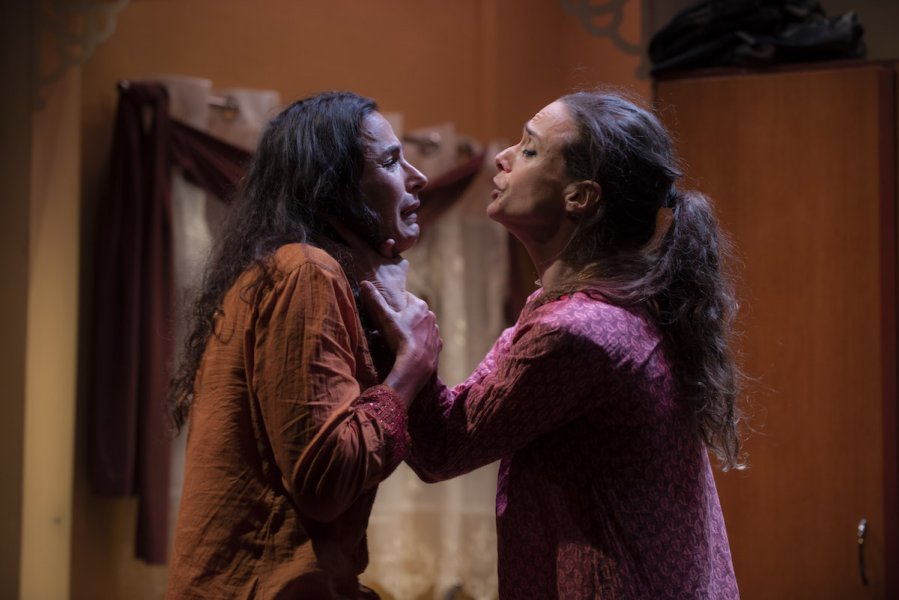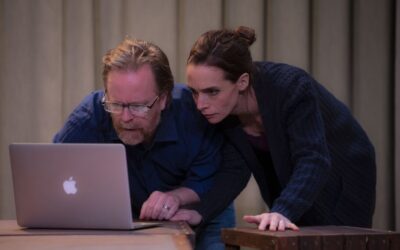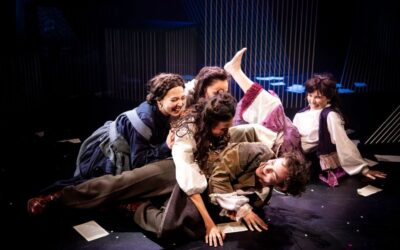By Anna Hayes
An audience member dropped, unknowing, into a seat would have been forgiven for thinking that they were watching a contemporary Australian drama at Red Stitch’s latest offering, the Australian première of Sylvia Khoury’s Selling Kabul.
The play, which was nominated for a Pulitzer in 2022, juxtaposes elements of kitchen sink drama with the deadly backdrop of Kabul in 2013 as U.S. forces begin to withdraw. Although set ten years ago, its content and message couldn’t be more timely.
Directed by Brett Cousins, Selling Kabul’s central premise is one that most viewers will recognise – Taroon, who acted as an interpreter for U.S. forces waits in hiding (or risk execution by the Taliban) for a special visa that will grant he and his family a new life in America. But the internet is broken and in terms of the visa, even though it’s never confirmed, we know enough from history to know that it will not be forthcoming.
To compound matters, his wife Bibi has just given birth to his son and it is too dangerous for him to risk going to her side.
Before the play even starts, we watch Taroon (Khrishaw Jones-Shukoor) shuffle aimlessly back and forth across the stage, watching TV, tinkering with an internet router, poking around in the kitchen and generally at a loose end.
The set is wonderfully immersive – it feels homely and yet Taroon does not fit into it. His agitation and constant pacing communicates the notion of a prison – it may have two doors but there is only one that he can use safely. As the play goes on, that space expands into the theatre – in short, it feels like we are all in that room with Taroon. The on-stage fans, persistently turned higher and higher to drown out any internal noise (and freeze the occupants) keep time with the unfolding action.
The plot begins to roll with the arrival of Afiya (Nicole Nabout), Taroon’s sister, who brings news of the birth of Taroon’s son. Everything is ok, she assures him – baby and mother are healthy, and yet we remain as unconvinced as Taroon. There is an intensity to every word and every delivery that puts us as on edge as those on stage.
Over the course of 90 minutes, we are slowly drip-fed the reality of the situation – the Taliban appears to be hunting Taroon and there is every chance that he will be dead before the night is out.
But amidst this backdrop, there is a softer story of people trying to help each other, trying to do the right thing. Towards the end of the play, as Taroon wonders what he has done (to cause certain events of the play), Afiya assures him that he did his best and that’s all any of them are trying to do.
This line really resonates as, through the play, we see Afiya’s dilemma and stress more clearly than anything. She has been hiding her brother for months while simultaneously struggling with her own fertility issues, and the shame that her husband’s choice of work brings upon them both.
Jawid (Farhad Zaiwala), Afiya’s husband, is a tailor who makes uniforms for the Taliban – Afiya, a seamstress, is also involved in the operation, and it is a bone of contention between brother and sister even though it offers the couple some semblance of protection – it is perhaps why Jawid and Afiya’s home hasn’t been torn apart already.
Completing the quartet of characters is Leyla (Claudia Greenstone) who takes the role of couple’s chatty neighbour and friend. She is a new mother who’s forced to pace the corridor outside to try and get her son to drop off to sleep. The consistent sound effect of the baby crying outside the door only serves to further heighten that sense of being trapped.
Cousins, in his direction, has really emphasised the claustrophobia that all of the characters feel, albeit in different ways. Each character is trapped – by fear, by duty and by love, the latter perhaps the hardest one to be objective about.
The sound, including various selections of klasik Afghan music, is used impressively and also helps to ratchet up the tension as both volume and tempo increase to an almost unbearable crescendo.
Jones-Shukoor is compelling as Taroon, the caged man who flits between bombastic bravado and pleading despair. His is an impossible position and he portrays a man wrestling with that reality very well – there are times when we don’t particularly like him, but we can never not empathise with him. His moments of introspection, like where he talks about watching the TV or why he volunteered as a translator are nicely realised and give him a more boyish, scared tone.
Greenstone gives Leyla a quirky kookiness as she rambles through her various anecdotes, missing any clue that she has overstayed her welcome. She’s a mother looking for a moment’s peace, a moment of friendship, away from the wails of her energetic baby. There appears to be no malice in her but we still don’t fully trust her, especially when she makes constant references to Taroon’s almost ghostly presence – does she know something? Has she talked?
There’s a skill in her progressively manic performance that also puts the audience on edge, makes us wonder and question the motives – it gives us the feeling of paranoia that someone in Taroon and Afiya’s position must be feeling.
Zaiwala, as the soft-spoken Jawid, is tremendous in a role where he has to be the voice of reason in desperate times. It’s a wonderfully nuanced performance because, like with Leyla, for large parts of the play we are unsure if his motivations are pure. The love between Jawad and Afiya is very touching – there is no questioning the deep bond that they share and even the arguments they have about Taroon’s presence centre around how to keep him safe.
Although the ensemble is strong, the play really belongs to Nabout who gives a powerhouse performance as Afiya, a strong, determined woman who is trying to hold everything together and keep everybody safe. She barely leaves the stage for the duration of the play and we see every emotion, every fret and frown play out across her face. In a situation that most of us could never imagine being in, she stands defiantly through it all.
As previously stated, if you hadn’t read a blurb beforehand, you’d be forgiven for not realising that the play was set in a war zone – there is little to anchor the piece in any particular land until we hear mention of the Taliban. It’s a clever mechanism because we’re watching people’s everyday lives playing out with our own preconceived outcomes and consequences.
It’s something that’s perhaps lacking a little from the play – some more grounding within the local environment. The news from the hospital is drip-fed to us but, with the exception of Leyla’s interactions and some later remarks regarding Bibi, we don’t really understand much of what life is like for the average citizen in a very unstable city. That could be part of creating the isolation around Taroon – it feels like the entire world is looking for him and nobody else – but I feel that it perhaps misses out on rooting the audience even more in the time and place. As it stands, only the mentions of the Taliban cement its setting.
In the same vein, I felt like there was more to be explored in the case of Taroon’s friendship with Jeff (his friend in the American military), whether it was personal lamentations on Taroon’s part or some more scathing criticism, like Afiya’s comments.
But, all in, this is a taut, tense piece of theatre that draws an audience in from the moment they enter the theatre. It’s a work that challenges viewers to consider how they might survive a similar situation, what choices they might make and, ultimately, what is worth fighting for.
Image: Jodie Hutchinson





